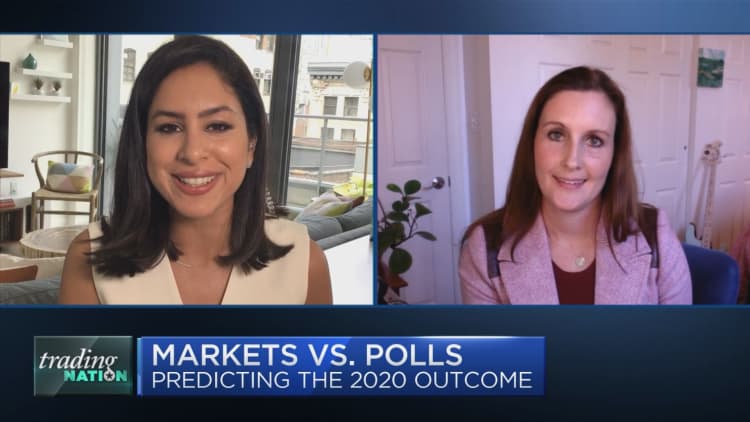
President Donald Trump still trails former Vice President Joe Biden in polling averages, including in swing states, but the wide national gap has slightly shrunk as the candidates sprint toward Election Day with less than two weeks to go.
Here's what some nationwide polling trackers showed Thursday morning:
- The NBC News national polling average had Biden up more than 8 percentage points over Trump, 51%-42.7%. That figure, down nearly 1 point since last week, is based on an unweighted average of the 10 most recent reliable public opinion polls.
- The RealClearPolitics general election polling average showed Biden with a 7.5-point lead over Trump. Seven days ago, the Democrat held a 9.2-point edge.
- FiveThirtyEight's national polling tracker gave Biden a 9.9-point advantage, 0.4 percentage points lower than where he stood a week earlier. But its models maintained that Biden has an 87% chance of winning the election.
The narrowing trend may offer a sign of encouragement for Trump, who is also behind Biden in favorability ratings and campaign fundraising numbers. With 12 days left until the election, however, the shift hardly suggests the president is likely to secure a popular vote victory.
But the presidency is not determined by the candidate with the most votes. In 2016, Democratic nominee Hillary Clinton won more than 2 million more votes than Trump, but still lost the election following a series of razor-thin defeats in key swing states that handed the Republican a majority of the Electoral College.
At this point in the race four years ago, Clinton, like Biden, held a sizable lead in national polls. She also led Trump, by a smaller margin, in a handful of swing states that ultimately proved decisive in her defeat. RealClearPolitics shows that Biden is ahead of where Clinton stood in these states 12 days out from Election Day.
The most recent CNBC/Change Research polls, released earlier this week, show Biden with leads in six key states, although some are tighter:
- Arizona: Biden 51%, Trump 45% (+6)
- Florida: Biden 50%, Trump 45% (+5)
- Michigan: Biden 51%, Trump 44% (+7)
- North Carolina: Biden 50%, Trump 47% (+3)
- Pennsylvania: Biden 49%, Trump 47% (+2)
- Wisconsin: Biden 52%, Trump 44% (+8)
Even if Trump catches up to Biden in the polls by Nov. 3, it might be too late. Mail-in voting numbers and early voting totals in numerous states are already leaps and bounds ahead of where they were in past elections. As of Thursday morning, more than 45 million Americans had already cast their ballots, according to U.S. Elections Project data.
The 2016 race turned dramatically in late October, when focus veered toward Clinton's use of a private email server. Controversies over emails had already played a major role in the election, following leaks of messages belonging to Democratic National Committee members that were stolen by Russian hackers. But then-FBI Director James Comey's public remarks about the Democrat's emails, delivered just a few days before the 2016 election, are arguably what cost her the presidency.
A number of "October surprise"-like events have already transpired in 2020, and so far none of them has significantly changed experts' views of the race.
Trump's announcement in early October that he and first lady Melania Trump tested positive for the coronavirus, and his subsequent hospitalization, coincided with a bump in the polls for Biden. But the president left Walter Reed National Military Medical Center after three days and has since returned to a jam-packed travel schedule, an apparent recovery that some say might work in his favor.
In recent days, the Trump campaign and its supporters have seized on another report about emails — this time from Biden's son Hunter Biden. The New York Post alleges the emails show Hunter Biden attempted to set up a meeting between his father and a top executive at a Ukrainian company he worked for while Joe Biden was vice president.
The report, which cites Trump lawyer Rudy Giuliani and former top advisor Steve Bannon as sources, has been treated with skepticism by other news outlets. But it's likely to come up Thursday night, when Trump and Biden face off in their second and final debate before the election.
The event, set to start at 9 p.m. ET in Nashville, will include a few changes made after the candidates' unruly first face-off in late September. Most notably, Trump and Biden will have their microphones turned off at certain times in order to avoid a shouting match mired in crosstalk and insults — as happened in the first debate.
Viewers largely recoiled at the ugly display, though polls showed Biden won. It's unclear if Trump, who interrupted far more than Biden and at times even lashed out at the moderator, will take a different approach Thursday night. He has already criticized NBC News' Kristen Welker, who is set to moderate the Nashville event, as "unfair."
Trump campaign manager Bill Stepien also shared a public letter urging the Commission on Presidential Debates to focus the debate on foreign policy. But the coronavirus pandemic is likely to be a main issue.
At least 222,220 people in the U.S. have died from Covid-19, and more than 8.33 million cases have been reported, according to Johns Hopkins University.


